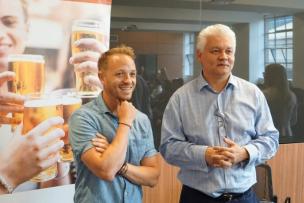InnoCentive uses the power of incentives to crowdsource solutions to business and technology problems and drive innovation.
Based in Waltham, Massachusetts, InnoCentive was originally a part of Eli Lilly, a pharmaceutical company, and was spun off as an independent entity in 2005.
Siobhan Gibney Gomis has been Senior Director of Operations and Deputy Head of EMEA for InnoCentive since early 2012, after the American company acquired its European rival OmniCompete.
How would you best describe what you guys do at InnoCentive?
InnoCentive crowdsources innovation problems to the world’s smartest people, who compete to provide ideas and solutions to important business, social, policy, scientific, and technical “Challenges.”
Commercial, government, and nonprofit organizations use us to help them identify and articulate their problems; broadcast them to ‘the crowd’ – our Solver network of over 275,000 experts across a variety of fields; select winning solutions; manage intellectual property; and award Solvers with monetary compensation (anywhere from US$500 to US$1 million)
What is the distinction between Grand Challenges and other Challenges?
There are two main differences between Grand Challenges and our typical Premium Challenge. The first concerns size: Grand Challenges are generally big, both in terms of the prize money, which is often in excess of $1 million, and time and scale, sometimes taking a few years to complete. Secondly, they are highly customizable to the client’s needs, often with events and an entire community being built up around the Challenge.
How would you describe the role that Solvers play in the InnoCentive business model?
Well, like a football club and its fans, we are nothing without our Solvers, because at the end of the day they are the ones solving the problems. The central part of the InnoCentive vision is to pluralize the problem solving process: tapping into the ‘global brain,’ creating a community of Solvers, and facilitating collaboration.
And we practice what we preach: the Solver community plays a part in our own business development. We have put out a number of Challenges asking the crowd for ways that we can improve our own products and services.
Are there any unique benefits to becoming a registered Solver?
By becoming a registered Solver, you can receive our newsletter containing the top Challenges from the week, allowing you to get a head start on your competitors. On top of that, you will have your own personal section on the website where you can view all the Challenges recommended to you based on your interests and expertise. We also provide the capability for Solvers to search for and connect with one another so that they can combine their unique skills to partner on Challenges. Winning Solvers receive badges and recognition for their efforts, which is great for their CVs.
Are you only looking for scientists and engineers to join your Solver network?
Not at all, you would be amazed at where the best ideas often come from. We run a real variety of Challenges, ranging from data prediction and drug development to innovative marketing strategies, so there’s something for everyone.
It doesn’t even have to be related to your day job: our Challenges can be a great way for people to make some money out of their hobbies. For instance, one of the Challenges we are currently running is looking for a diabetic cookie that tastes just like the real thing, so if there are any aspiring diabetic chefs out there, then get involved!
Do you ever get any business-related Challenges?
Absolutely. While InnoCentive got its start running scientific and technical Challenges, in 2008 we introduced the concept of an Ideation Challenge, which seeks innovative ideas (as opposed to discrete scientific proposals or artifacts). Since this time, we’ve run hundreds of Ideation Challenges, and from a business perspective, these have included banking and finance, entrepreneurship, infrastructure, digital and social marketing, branding, and product marketing Challenges.
How would you rate the value of a Solver possessing an MBA, as opposed to any other advanced degrees?
Well, of course this somewhat depends on the particular Challenge, but there are certainly cases where having an MBA can put Solvers at an advantage, not only because they have the specialist knowledge needed to participate in our business-related Challenges but because of the transferable skills that come with it: the commercial awareness, the customer-centric approach, and the strategic awareness of cause and effect.
Are you running any Challenges right now where you think a MBA might provide additional insight or added value?
There’s several I think would be ideal for MBA graduates. One we’re running at the moment is looking for new ways to encourage heartburn sufferers to try a preventative over-the-counter medication through word of mouth, essentially calling for a new promotional campaign.
In another, a health insurance company is looking for ways to improve their members' online experience, something that improves an individual’s ability to make decisions on their own health and healthcare – a task that seems conducive to the marketing expertise and customer-centric perspective MBA graduates are able to bring.
But these are just a few I’ve picked out. If you visit the Challenge Center on our website, we’ve got a whole category devoted to ‘Business/Entrepreneurial’ type challenges, so you’ll be able to see them all there.
RECAPTHA :
9f
ac
17
f0



 6
6 



Comments.